For the UW-Madison College of Engineering, 2019 was a year full of extraordinary achievements. We continued to push the boundaries of scientific knowledge on many fronts, improve the quality of people’s lives through our engineering expertise and leadership, and deliver meaningful hands-on educational experiences that prepare our students to excel in their careers, become leaders and make a difference.
Research breakthroughs
In 2019 our faculty led many advances in a wide range of fields. Some of their most significant accomplishments over the past year included:
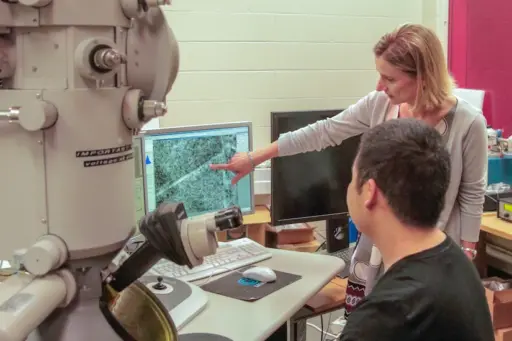 Professor Izabela Szlufarska made a discovery that upends previous notions about how metals deform.
Professor Izabela Szlufarska made a discovery that upends previous notions about how metals deform.
- A “smart” glass that can recognize images without requiring any sensors or power
- A noninvasive, low-cost device that could help reverse baldness
- A strategy to deliver anti-cancer drugs directly to brain tumors, by harnessing molecules derived from sea lamprey
- Discovering a new mechanism for bending metals, which could guide the creation of stronger, more durable materials
- A novel electrode that can be injected as a liquid and then morph into a flexible wire in the body, which could dramatically simplify neuromodulation therapies
- A new compact, professional-quality spectrometer that could help turn ordinary smartphones into advanced analytical tools
- A coating that could thwart an infrared camera by camouflaging thermal light emission
- Developing an inexpensive, industry-compatible process to make a plastics chemical from plant sugars
- A web-based app that helps hospitals improve newborn screening efficiency
- A method to grow graphene nanoribbons directly on top of silicon wafers, which could lay the groundwork for ultrapowerful computers
- Developing a way to consistently create small-diameter artificial vascular grafts that behave like native blood vessels
- New insight about the chemical reactions that power fuel cells, which could help drive down costs for the alternative power technology
- A personalized in vitro model for kidney cancer drug screening
- Developing a promising new cell therapy with potential to improve tissue healing after orthopedic injuries
- A new imaging technique that lets scientists see around corners
- Discovering a new phenomenon that could help unlock new abilities for soft materials
- A better understanding of how fractures occur in cartilage
- A framework for determining the impact of emergency room admission decisions on patient outcomes
- Developing a theoretical basis for a drug-delivery system that uses the power of magnets to release therapeutic molecules right where they’re needed
- A method to identify bio-based compounds that hold promise as potential replacements for petrochemicals
- Gaining a better understanding of atomic-level catalysis by harnessing computation
- A reconfigurable microfluidic system that allows researchers to more effectively model intercellular communications
- A new technique that enables versatile 3D control over stem cell-derived organoids
- Insight into hydrologic infrastructure challenges posed by the growing trend of more frequent extreme rainfall events
- Using a mathematical modeling approach to help inform mammography screening strategies for women with Down syndrome
- Quantifying the impact of groundwater on a range of ecosystem services
- A computational method to uncover new details of dynamic biological processes, such as stem cell differentiation
- Finding that aquatic invasive species are short-circuiting benefits from mercury reduction in the Great Lakes
- Creating a new tool that uses light to control gene expression in yeast cells
- Developing optimization models that can help organizations strengthen their cybersecurity
- Engineering a microbe that may be key to producing plastic from plants
Ambitious projects, far-reaching partnerships
In October 2019, the college opened the Jun and Sandy Lee Wisconsin Structures and Materials Testing Laboratory. The new facility—a 2,500 square-foot addition to the structures lab in Engineering Hall—will allow structural engineering faculty, students, collaborators and industry partners to forge new ground in full-scale testing and evaluating structural elements and building materials.
Investments in our renowned fusion experiments will ensure UW-Madison continues its long history as a leader in fusion research. Specialized upgrades to the college’s one-of-a-kind Helically Symmetric eXperiment, or HSX, will enable higher-energy plasma experiments that could help bring humanity a step closer toward harnessing fusion energy. We also secured funding and support for our Pegasus experiment, and a major expansion to that experiment will allow us to play an even greater role in advancing the field of fusion science.
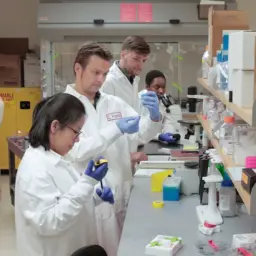 Professor Christian Franck and his students are investigating how concussions and other traumatic brain injuries originate in the brain at the cellular level.
Professor Christian Franck and his students are investigating how concussions and other traumatic brain injuries originate in the brain at the cellular level.
UW-Madison has a rich history of water research, and we’re building on our excellence in this area by establishing the Core Facility for Advanced Water Analysis. Administered by the Department of Civil and Environmental Engineering, the facility will feature new instrumentation and create opportunities for collaboration among water researchers across the UW-Madison campus.
Our faculty are passionate about leveraging their research to help solve pressing societal problems such as the national opioid crisis. For example, we’re leading a $2 million National Institutes of Health (NIH) grant to test a novel liquid metal electrode as an alternative means of treating chronic back pain. In addition, we’re collaborating in a multi-institution research project to identify non-opioid drug treatments. And we’re using mathematical modeling to help inform strategies for disrupting opioid supply chains. The Center for Health Enhancement Systems Studies (CHESS), based in the Department of Industrial and Systems Engineering, also received a five-year NIH grant to help drive solutions to the opioid crisis.
We’re also leading a variety of other research efforts aimed at benefiting human health, including building new tools for targeting fungal infections and harnessing new brain imaging sensors to study epileptic seizures. We’re studying how a female sex hormone improves heart function in pulmonary arterial hypertension. And we’re working to model and understand differences in calcific aortic valve disease progression between sexes. We’re catalyzing interdisciplinary collaborations with the goal of enabling better detection, treatment and prevention of traumatic brain injuries. A collaboration with the Medical College of Wisconsin is harnessing novel imaging technology to understand the role that melanin plays in healthy vision and eye disease. Building on past advances, we’re generating preclinical data using an innovative bandage that accelerates wound healing with gentle electrical pulses.
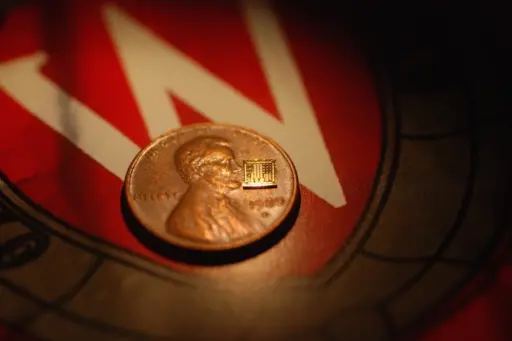 Professor Jack Ma and his collaborators are developing bipolar transistors made with diamond. Image credit: Sang June Cho
Professor Jack Ma and his collaborators are developing bipolar transistors made with diamond. Image credit: Sang June Cho
In our healthcare system, clinician burnout is a major issue, correlating with a higher risk of medical errors and negative interactions with patients. We contributed our expertise to a national report recommending systemic improvements to address the problem.
With a $4.85 million grant from the U.S. Defense Advanced Research Projects Agency, we’re leading a multi-institutional team to create bipolar transistors made with diamond that can transmit signals with higher dynamic ranges than any other existing technologies.
Our faculty are tackling a variety energy-related challenges. We are developing new methods based on mathematical optimization that will help the grid reliably deliver power, even in the event of unpredictable natural disasters. These methods could also help ensure continuous power delivery as more and more renewable (and intermittent) energy sources are added to the grid. We’re also creating a tool to monitor grid stability and notify control operators of potential problems.
Our faculty continued to garner funding from the U.S. Department of Energy (DOE) for advanced nuclear research. And with a $1.8 million grant from the DOE’s ARPA-E program, we are accelerating the development of materials that can withstand the corrosive environment within a molten salt nuclear reactor.
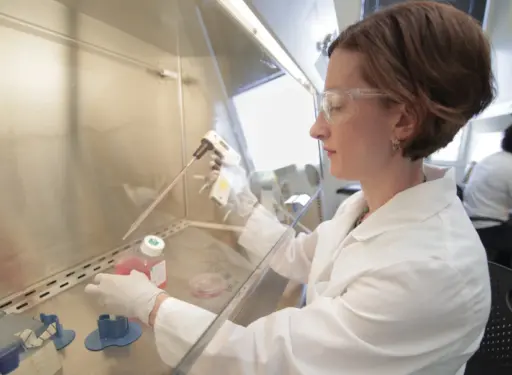 Professor Kristyn Masters is studying how heart valves “break” differently in men and women.
Professor Kristyn Masters is studying how heart valves “break” differently in men and women.
In addition, we are helping to address international nuclear proliferation risks and enhancing nuclear security through our participation in two new consortia.
As our faculty pursue their research, they look for ways to translate their discoveries into solutions that can address practical challenges and needs in industry. For example, we’re developing a strategy for transforming waste from the Greek yogurt-making process into a high-value sweetener product. This technology could deliver an economic windfall for dairy producers. And we’re partnering with companies like 3M to develop advanced data science approaches that will lead to improvements in productivity and product quality with significant cost savings.
Our engineers embrace the Wisconsin Idea, and their research projects reflect their commitment to benefiting people’s lives in Wisconsin and beyond with their work. For example, with support from a Baldwin Wisconsin Idea Grant, CEE PhD student Sarah Dance is working on a project to build connections between UW-Madison and Native American tribes around wild rice protection and restoration efforts.
In addition, our engineers are making an impact around the world. Mechanical Engineering Professor Tim Osswald is advising the Colombian government on policy for its new Ministry of Science, Technology and Innovation.
Outstanding faculty
College of Engineering faculty earn prestigious honors for their research and teaching. In 2019, National Academy of Engineering (NAE) posthumously named Mechanical Engineering Professor Robert Lorenz, a pioneer in sensing and controls, to its 2019 class of fellows. In addition, Professor Xudong Wang and Baldovin-DaPra Associate Professor Victor Zavala received the prestigious Presidential Early Career Award for Scientists and Engineers (PECASE).
In 2019, we established historic endowed chair positions in three of our departments with support from major gifts. The John Bollinger Chair of Mechanical Engineering, the Robert Byron Bird Department Chair in Chemical and Biological Engineering, and the Peter Tong Chair of Biomedical Engineering will each provide significant flexible funding to enable the chairs to take those departments to the next level.
The National Science Foundation named seven of our faculty members recipients of its Faculty Early Career Development (CAREER) awards. These awards support early-career faculty who have the potential to serve as academic role models in research and education, as well as leaders within their institutions.
Our 2019 NSF CAREER award recipients are: BME Assistant Professor Jeremy Rogers; CEE Assistant Professor Paul Block; CEE Assistant Professor Matt Ginder-Vogel; ECE Assistant Professor Dimitris Papailiopoulos; ECE Assistant Professor Andreas Velten; ECE Assistant Professor Younghyun Kim; and ME Assistant Professor Sangkee Min.
The college is growing with new faculty hires. Meet our new faculty members, and learn about their research:
- BME Assistant Professor Aviad Hai builds tools to expand our understanding of the brain.
- BME Assistant Professor Melissa Kinney analyzes gene expression in stem cells on large scales and studies the behavior and communication among those cells.
- BME Assistant Professor Colleen Witzenburg studies cardiovascular tissue structure and function.
- CBE Assistant Professor Marcel Schreier (joining us in January 2020) has ambitious plans to develop more efficient and sustainable ways to interconvert electrical and chemical energy.
- CBE Assistant Professor Matt Gebbie will focus on how molecules behave at the interfaces between solids and liquid, which is important for batteries, solar cells and other energy storage and generation devices.
- CEE Assistant Professor Jesse Hampton will work on research into enhanced geothermal systems, oil and gas energy extraction, energy, waste and CO2 storage and underground construction and tunneling.
- CEE Assistant Professor Zhenhua Zhu hopes his research will enable automation in the construction industry, sometimes called “smart construction.”
- ECE Assistant Professor Kangwook Lee hopes to extend information theory and coding beyond simple machine learning problems like linear regressions, to apply the concepts to trickier problems like deep learning.
- ECE Assistant Professor Chu Ma is working to take acoustic sensing, the technology behind ultrasound, to new levels.
- ECE Assistant Adjunct Professor Matt Malloy brings real-world experience to teaching machine learning and data science.
- EP Professor Curt Bronkhorst sheds light on how metallic materials deform and fail, which has far-reaching implications for components made of metal, including in vehicles, aircraft and countless other structures.
- EP Assistant Professor Jennifer Choy will focus on developing methods to control photons and their interactions with atomic systems, which will enable better understanding and control of quantum properties.
- EP Assistant Professor Benedikt Geiger focuses on research into high-temperature plasma physics, with the ultimate goal of achieving fusion energy.
- EP Assistant Professor Yongfeng Zhang studies how materials degrade in extreme conditions using microstructure-based modeling.
- ISyE Assistant Professor Justin Boutilier uses optimization and machine learning to improve healthcare access, delivery and quality, particularly in low- and middle-income settings.
- MS&E Assistant Professor Dawei Feng researches the combination of metals and organic molecules to create new solid state compounds with properties that could be useful in applications ranging from advanced electronics to medicine.
- ME Assistant Professor Joseph Andrews studies printable and flexible electronics for sensor development.
- ME Assistant Professor Lianyi Chen studies metal additive manufacturing and opportunities for new material development using 3D printing.
- ME Assistant Professor Dakotah Thompson focuses on understanding thermal transport and energy conversion at nanometer length scales.
- ME Assistant Professor Josh Roth, who also holds an appointment in the Department of Orthopedics and Rehabilitation, investigates treatments of musculoskeletal injuries and disease, with the goal of enhancing personalized treatments for patients.
- ME Assistant Professor Xiangru Xu draws on his expertise in feedback control theory to develop better control algorithms for autonomous systems that provide safety guarantees while maintaining those systems’ performance.
Education and Student Achievements
As one of the top colleges of engineering in the world, the UW-Madison College of Engineering delivers an outstanding engineering education, and that includes providing our students with cutting-edge facilities that foster creativity and enable active, hands-on learning opportunities.
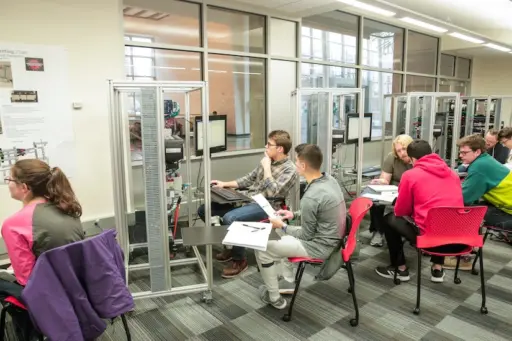 Students take advantage of the top-of-the-line industrial control equipment in the Rockwell Automation Industrial Connected Enterprise Lab.
Students take advantage of the top-of-the-line industrial control equipment in the Rockwell Automation Industrial Connected Enterprise Lab.
In spring 2019, undergraduates in the Computer Control of Machines and Processes (ME 447) class were the first students to get the opportunity to use the top-of-the-line industrial control equipment in the new Rockwell Automation Industrial Connected Enterprise Lab to work on problems as part of their coursework. It’s just one of many valuable hands-on learning experiences that allow our students to get comfortable using equipment and technologies they’ll encounter working in industry.
Our faculty continue to be leaders in educational innovation, creating rich opportunities to engage students with relevant, real-world challenges. For example, a new Machine Learning in Action course taught by ISyE Assistant Professor Justin Boutilier, undergraduate and graduate students apply machine learning methods to real datasets, giving them a taste of data science work. And in a process design class taught by CBE Professor George Huber, undergraduates worked on real-world solutions for making diesel fuel blendstocks from plant-based ethanol.
We’ve launched new one-year master’s programs to better serve students seeking to advance in their careers. In the fall 2019 semester, the Department of Biomedical Engineering launched two programs: an accelerated version of the BME department’s traditional master’s program, minus the research requirements, and a master’s program in biomedical innovation, design and entrepreneurship through a partnership with the Wisconsin School of Business.
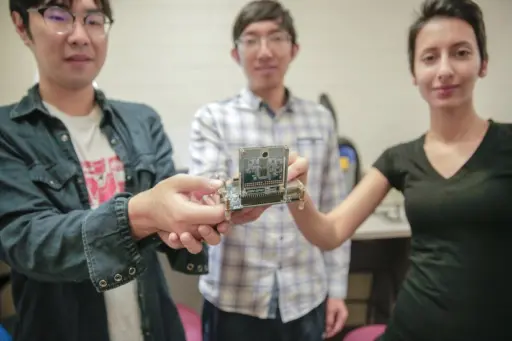 ECE PhD students Jingjie Li (left), Zongshen Wu (middle) and Setareh Behroozi (right) developed a technology that enables privacy protections for smart cameras.
ECE PhD students Jingjie Li (left), Zongshen Wu (middle) and Setareh Behroozi (right) developed a technology that enables privacy protections for smart cameras.
And in October 2019, applications opened for the new Master of Science in Design and Innovation. The one-year, face-to-face program is highly interdisciplinary and collaborative, and integrates aspects of design techniques and tools from multiple perspectives, including engineering, design thinking, business, visualization, social science, art and more.
Beyond their impressive academic achievements, our talented students distinguish themselves with their entrepreneurial endeavors. Two teams of ECE graduate students were among the winners in the final round of Foxconn Technology Group’s inaugural “Smart Cities-Smart Futures” competition. One winning team proposed a smart ID wristband for hospital patients to help improve treatment. The other team developed a concept called Nightshift, which would empower smart cameras to preserve people’s anonymity. And ECE PhD student Ashray Manur is working to improve electricity reliability in the developing world via smart microgrids with his startup Elektrifi.
Our student organizations give participants the opportunity to take lessons learned in the classroom and apply them to challenges while competing against the best teams from around the world. Our Wisconsin Robotics team won the Land O’Lakes Bot Shot competition, which challenged collegiate robotics teams from around the country to build a robot capable of mastering shots from a variety of basketball court locations. And in July 2019, the Badgerloop team was among the international elite participating in the fourth annual SpaceX Hyperloop competition.